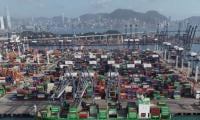APTMA seeks zero-rating regime revival for export boost
ISLAMABAD: APTMA has asked PM Shehbaz Sharif to restore the zero-rating status for survival of the export industry, saying around 60 percent the textile industry had closed down on an extreme liquidity crunch, while the rest were on their way to closure, it warned.
Around Rs300 billion of the industry had remained with the Federal Board of Revenue (FBR) as a result of the collection and refund mechanism, it said. In a letter on Monday, All Pakistan Textile Mills Association (APTMA) patron-in-chief Gohar Ejaz drew attention of the prime minister to the liquidity crisis that was resulting in a massive loss of exports and an increase in unemployment.
“The liquidity crisis has occurred due to demand destruction at the onset of a recession in export destinations, abandonment of the FASTER system commitment to pay refunds within 72 hours, and foreign buyers extending their payment period against shipments, the letter with a subject ‘textile sector is shutting down’ read.
The currency depreciation of 60 percent with the last year with no corresponding increase in working capital facilities and accumulation of deferred sales tax not refunded for the last 3 years also contributed in the crisis, it added.
APTMA argued for restoration of SRO 1125 zero rating saying that in FY22, the total amount retained by the FBR as sales tax on domestic sales was only Rs50 billion, out of the Rs249 billion collected.
Approximately, a huge amount of Rs300 billion of the industry had remained with the FBR at all times as a result of the collection and refund mechanism, as the production chain takes between 6 to 9 months before final export and refund claim, the association said.
“Sales tax is consumption based, which inflates inventory and capital costs, serving as an impediment to new projects and increase in business as capital and operating cost increase by 20 percent and refund can only happen after commercial operations.”
The letter pointed out that an IMF report that says the cascading effect of GST had harmed Pakistani exporters' competitiveness as there was currently no systemic method to ensure that all tax paid on inputs might be charged against a final sale was fully refunded.
“The imposition of sales tax has resulted in billions (over Rs300 billion) of rupees of liquidity transferring from the industry to the FBR.” Rather than encouraging import substitution, the sales tax regime did opposite by dis-incentivising local production and promoting cheap imports, APTMA lamented.
“When a company holding a DTRE, Bond or EOU license needs to buy raw materials like cotton, yarn or greige fabric, if it imports them through these schemes, it does not have to pay sales tax or duties, whereas, if they buy the same material from domestic industry, it is required to pay 17 percent GST and wait for its ultimate refund after exports which entails a wait of over nine months,” APTMA chief said.
He added that the government already owed refunds worth over Rs300 billion to exporters and had no fiscal space for making that payment.
“There is no reason for exporters to believe that they will get their sales tax refunded in due time while their prior refunds still remain unpaid, thereby depriving them of liquidity and of their own resources in order to tax local consumption of less than 20 percent of the industry’s output.” Eliminating the sales tax waiver for a fragmented export industry (80 percent of all output) with a long and complex value chain had increased the production cost for exporters, Ejaz said.
The letter continued that zero rating was rescinded for the export-based industry in the June 2019 budget announcement. The decision was based on a misrepresentation by the FBR that claimed that domestic sales constituted more than 50 percent of all production of the textile sector and somehow the industry was evading approximately $12 billion worth sales tax on domestic sales, APTMA chief claimed.
He stated that domestic sales of the sector do not exceed 20 percent of industrial output, as later conceded by the FBR. “Back in 2019, the government assured industrialists that they will examine the issue in 6 to 8 months, but no such review has been taken even after the passing of 3 years,” concludes the letter.
-
 Eric Dane’s Friends Initiate GoFundMe To 'support' His Two Daughters After His Death At 53
Eric Dane’s Friends Initiate GoFundMe To 'support' His Two Daughters After His Death At 53 -
 Internet Erupts After Candace Owens Claims Elon Musk And Sam Altman Are ‘not Human’
Internet Erupts After Candace Owens Claims Elon Musk And Sam Altman Are ‘not Human’ -
 Will Princess Beatrice, Eugenie Stay In Contact With Andrew? Source Speaks Out
Will Princess Beatrice, Eugenie Stay In Contact With Andrew? Source Speaks Out -
 ‘AI Revolution Is Coming Fast & US Has No Clue,’ Bernie Sanders Warns Of Speed Of Disruption
‘AI Revolution Is Coming Fast & US Has No Clue,’ Bernie Sanders Warns Of Speed Of Disruption -
 Hong Kong Touts Stability,unique Trade Advantages As Trump’s Global Tariff Sparks Market Volatility
Hong Kong Touts Stability,unique Trade Advantages As Trump’s Global Tariff Sparks Market Volatility -
 ‘Miracle On Ice’ Redux? US Men Chase First Olympic Hockey Gold In 46 Years Against Canada
‘Miracle On Ice’ Redux? US Men Chase First Olympic Hockey Gold In 46 Years Against Canada -
 Friedrich Merz Heads To China For High Stakes Talks In An Effort To Reset Strained Trade Relations
Friedrich Merz Heads To China For High Stakes Talks In An Effort To Reset Strained Trade Relations -
 Astronauts Face Life Threatening Risk On Boeing Starliner, NASA Says
Astronauts Face Life Threatening Risk On Boeing Starliner, NASA Says -
 Hailey Bieber Reveals How Having Ovarian Cysts Is 'never Fun'
Hailey Bieber Reveals How Having Ovarian Cysts Is 'never Fun' -
 Kayla Nicole Looks Back On Travis Kelce Split, Calls It ‘right Person, Wrong Time’
Kayla Nicole Looks Back On Travis Kelce Split, Calls It ‘right Person, Wrong Time’ -
 Prince William And Kate Middleton Extend Support Message After Curling Team Reaches Olympic Gold Final
Prince William And Kate Middleton Extend Support Message After Curling Team Reaches Olympic Gold Final -
 Nvidia CEO Praises Elon Musk, Calls Him An ‘extraordinary Engineer'
Nvidia CEO Praises Elon Musk, Calls Him An ‘extraordinary Engineer' -
 Shia LaBeouf's Mugshot Released After Mardi Gras Arrest On Battery Allegations In New Orleans
Shia LaBeouf's Mugshot Released After Mardi Gras Arrest On Battery Allegations In New Orleans -
 Timothee Chalamet Felt '17 Again' After Reunion With 'Interstellar' Director Christopher Nolan
Timothee Chalamet Felt '17 Again' After Reunion With 'Interstellar' Director Christopher Nolan -
 Conan O'Brien Speaks First Time After Rob Reiner's Killing
Conan O'Brien Speaks First Time After Rob Reiner's Killing -
 Giant Tortoise Reintroduced To Island After Almost 200 Years
Giant Tortoise Reintroduced To Island After Almost 200 Years



